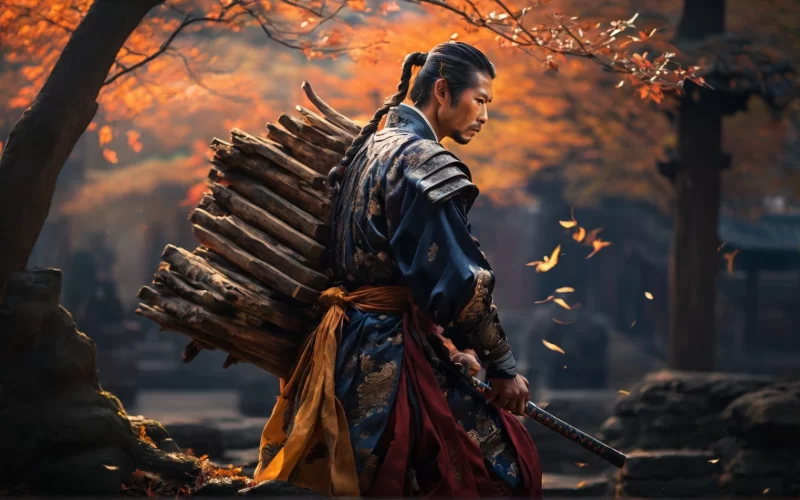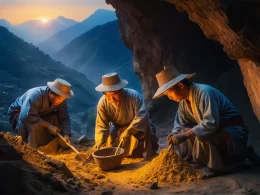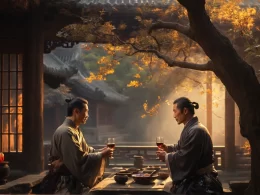Idiom Explanation:
Carrying thorns on one's back to ask for punishment. It means to take the initiative to confess one's fault and ask for chastisement.
Pronunciation:
负荆请罪
fù jīng qǐng zuì
Origin:
《史记·廉颇蔺相如列传》:相如曰:“夫以秦王之威,而相如廷叱之,辱其群臣,相如虽弩,独畏廉将军哉!顾吾念之,强秦之所以不敢加兵予赵者,徒以吾两人在也,今两虎共斗,其势不俱生,吾所以为此者,以先国家之急而后私仇也。”廉颇闻之,肉袒负荆。因宾客至蔺相如门谢罪,曰:“鄙贱之人,不知将军宽之至此也!”卒相与欢,为刎颈之交。
Story:
During the Warring States period, there were seven great powers: Qi, Chu, Yan, Han, Zhao, Wei, and Qin, historically known as the "Seven Heroes of the Warring States". Among these seven powers, Qin was the most powerful. Qin often bullied Zhao. Once, the king of Zhao sent one of his ministers, Lin Xiangru, to Qin to negotiate with him. When Lin Xiangru met with the Qin king, he was so clever and brave that he gained a lot of face for the state of Zhao. When the king of Qin saw that Zhao had such a talent, he dared not underestimate Zhao anymore. Seeing that Lin Xiangru was so capable, the king of Zhao first made him a "dafu" and then a superior minister (equivalent to a later prime minister).
At that time, there was an old general named Lian Po in Zhao. He was a meritorious minister who had done great service to the state of Zhao, so he was very proud of himself. When the king of Zhao thought highly of him and promoted him, Lian Po was not convinced and said to others, "As the general of Zhao, I have made a lot of achievements for my country through my sacrifices in the battlefield over the years. But he, Lin Xiangru, with only his mouth, had no great skills, but his position was even higher than mine, how could I bear it? I really feel ashamed to face others." He also angrily threatened, "If I meet Lin Xiangru, I will embarrass him to his face and see what he can do to me!"
These words of Lian Po reached the ears of Lin Xiangru. Immediately, Lin Xiangru told his men to give way to Lian Po's men and not to argue with them when they met him. In the future, when he went out in his own carriage, as soon as he heard that Lian Po was coming in front of him, he asked the coachman to drive the carriage to a small alley and wait for Lian Po to pass before leaving.
When the men under Lian Po saw how much the superior minister gave way to his master, they became even more complacent and laughed at Lin Xiangru's men when they saw them. The men under Lin Xiangru could not bear this, so they said to him, "Your position is higher than General Lian's, but he scolded you, but you avoided him and gave way to him, so that he would not take you into consideration anymore. We can't stand it if it goes on like this."
Lin Xiangru asked them calmly, "Which one is more powerful, General Lian or the King of Qin?" The group said, "Of course, the King of Qin is powerful." Lin Xiangru said, "That's right! I am not afraid of the king of Qin, so why should I be afraid of General Lian? You know, Qin does not dare to fight Zhao now because the civil and military officials in the country are of one mind. The two of us are like two tigers. If two tigers fight, one of them will be injured or even die, which will give Qin a good opportunity to attack Zhao. Think about it, is the matter of the state important, or is private face important?"
When Lin Xiangru's men heard this, they were so moved that when they saw Lian Po's men in the future, they were careful and always gave way to them.
When Lin Xiangru's words reached Lian Po's ears, he was ashamed. He took off one sleeve, exposed his shoulder, carried a thorn on his back, and went straight to Lin Xiangru's house. Lin Xiangru rushed out to meet him. Lian Po knelt down before him, held the thorn with both hands, and asked him to whip himself. Lin Xiangru threw the thorn on the ground and hurriedly picked up Lian Po with both hands, dressed him, took his hand and asked him to sit down.
From then on, Lin Xiangru and Lian Po became very good friends. As a result, Qin did not dare to bully Zhao anymore. The idiom of "begging for sin" became an idiom, which means to apologize to someone and admit one's mistake.












